ethicalTheories
伦理学家思想总结英语翻译
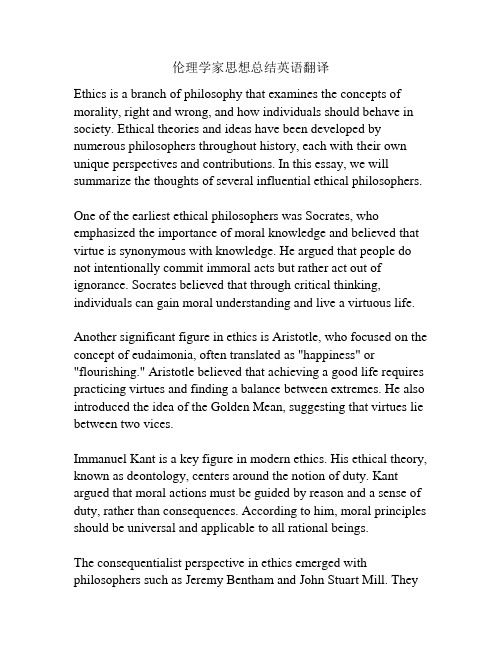
伦理学家思想总结英语翻译Ethics is a branch of philosophy that examines the concepts of morality, right and wrong, and how individuals should behave in society. Ethical theories and ideas have been developed by numerous philosophers throughout history, each with their own unique perspectives and contributions. In this essay, we will summarize the thoughts of several influential ethical philosophers.One of the earliest ethical philosophers was Socrates, who emphasized the importance of moral knowledge and believed that virtue is synonymous with knowledge. He argued that people do not intentionally commit immoral acts but rather act out of ignorance. Socrates believed that through critical thinking, individuals can gain moral understanding and live a virtuous life.Another significant figure in ethics is Aristotle, who focused on the concept of eudaimonia, often translated as "happiness" or "flourishing." Aristotle believed that achieving a good life requires practicing virtues and finding a balance between extremes. He also introduced the idea of the Golden Mean, suggesting that virtues lie between two vices.Immanuel Kant is a key figure in modern ethics. His ethical theory, known as deontology, centers around the notion of duty. Kant argued that moral actions must be guided by reason and a sense of duty, rather than consequences. According to him, moral principles should be universal and applicable to all rational beings.The consequentialist perspective in ethics emerged with philosophers such as Jeremy Bentham and John Stuart Mill. Theyadvocated for utilitarianism, which posits that the moral worth of an action is determined by its ability to bring about the greatest amount of happiness for the greatest number of people. Utilitarians weigh the consequences of actions and consider the overall net happiness they generate.Friedrich Nietzsche had a different take on ethics. He criticized traditional moral values and argued that morality is subjective and varies from person to person. Nietzsche believed that individuals should create their own values based on their individual desires and interests. This idea is often associated with moral relativism.Existentialism, a philosophical movement popularized by Jean-Paul Sartre, also challenged traditional ethical frameworks. Existentialists argue that individuals are responsible for creating their own existence and meaning in a world devoid of inherent purpose. According to existentialism, individuals have freedom of choice and bear the consequences of their actions.A more contemporary ethical perspective is the ethics of care, developed by feminist philosophers such as Carol Gilligan and Nel Noddings. The ethics of care emphasizes the importance of relationships, empathy, and compassion in ethical decision-making. This approach critiques traditional ethics for focusing too much on abstract principles and not enough on the concrete realities of human relationships.These are just a few examples of influential ethical thinkers and their philosophies. Ethics is a complex and evolving field, with countless other philosophers and ideas contributing to its diverselandscape. The study of ethics offers valuable insights into moral questions and provides frameworks for individuals and societies to navigate their moral decisions.。
双语讲稿-我们为什么辩论?只是为了赢?
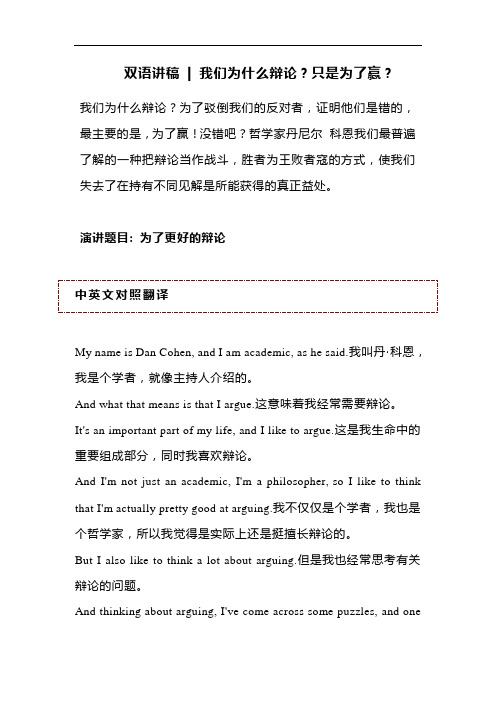
双语讲稿| 我们为什么辩论?只是为了赢?我们为什么辩论?为了驳倒我们的反对者,证明他们是错的,最主要的是,为了赢!没错吧?哲学家丹尼尔科恩我们最普遍了解的一种把辩论当作战斗,胜者为王败者寇的方式,使我们失去了在持有不同见解是所能获得的真正益处。
演讲题目: 为了更好的辩论My name is Dan Cohen, and I am academic, as he said.我叫丹·科恩,我是个学者,就像主持人介绍的。
And what that means is that I argue.这意味着我经常需要辩论。
It's an important part of my life, and I like to argue.这是我生命中的重要组成部分,同时我喜欢辩论。
And I'm not just an academic, I'm a philosopher, so I like to think that I'm actually pretty good at arguing.我不仅仅是个学者,我也是个哲学家,所以我觉得是实际上还是挺擅长辩论的。
But I also like to think a lot about arguing.但是我也经常思考有关辩论的问题。
And thinking about arguing, I've come across some puzzles, and oneof the puzzles is that as I've been thinking about arguing over the years, and it's been decades now, I've gotten better at arguing, but the more that I argue and the better I get at arguing, the more that I lose.说起辩论,我曾有过一些困惑,而其中一个困惑是,我多年前开始考虑如何辩论,至今已有二十多年了,我也变得更善于辩论,但是越是辩论,我就能从中获取更多,同时也失去更多。
2024版《思想道德与法治》教材导读英文版

2024版《思想道德与法治》教材导读英文版2024 Edition "Ideology, Ethics, and Legal Studies" Textbook GuideWelcome to the guide for the 2024 edition of the "Ideology, Ethics, and Legal Studies" textbook! In this document, you will find a comprehensive overview of the key topics covered in the textbook, as well as some tips on how to navigate and make the most of your study experience.The textbook is designed to provide a deep understanding of the fundamental principles of ideology, ethics, and legal studies. It covers a wide range of topics, including the history of political thought, ethical theories, and the foundations of legal systems. By studying this textbook, you will gain valuable insights into the complex interplay between ideas, values, and laws in society.As you delve into the chapters of the textbook, you will encounter a diverse range of perspectives and arguments. It is important to approach each topic with an open mind and a critical eye, as this will help you to develop a nuanced understanding of the issues at hand. Make sure to engage actively with the material, asking questions and seeking clarification where needed.To get the most out of your study experience, we recommend creating a study schedule and setting aside dedicated time each day to read and reflect on the textbook. You may also find it helpful to form study groups with your peers, as this can provide additional insights and perspectives on the material.Overall, the 2024 edition of the "Ideology, Ethics, and Legal Studies" textbook is a valuable resource for students looking to deepen their understanding of these important fields. By approaching the material with curiosity and diligence, you will be well-equipped to navigate the complex landscape of ideas, values, and laws that shape our society.Good luck with your studies, and enjoy exploring the fascinating world of ideology, ethics, and legal studies!。
哲学短文古希腊英文
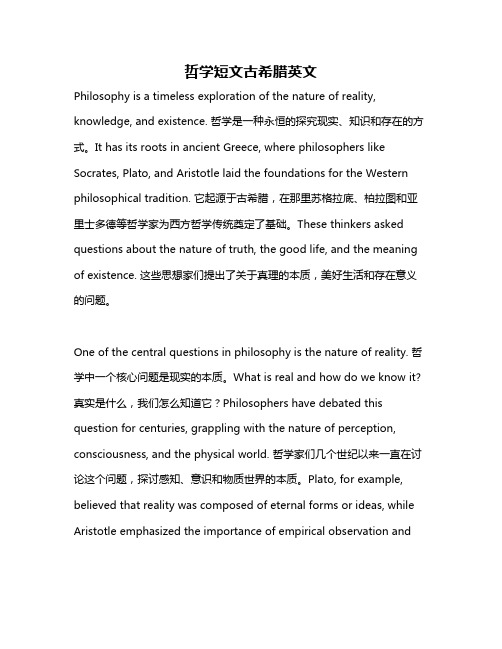
哲学短文古希腊英文Philosophy is a timeless exploration of the nature of reality, knowledge, and existence. 哲学是一种永恒的探究现实、知识和存在的方式。
It has its roots in ancient Greece, where philosophers like Socrates, Plato, and Aristotle laid the foundations for the Western philosophical tradition. 它起源于古希腊,在那里苏格拉底、柏拉图和亚里士多德等哲学家为西方哲学传统奠定了基础。
These thinkers asked questions about the nature of truth, the good life, and the meaning of existence. 这些思想家们提出了关于真理的本质,美好生活和存在意义的问题。
One of the central questions in philosophy is the nature of reality. 哲学中一个核心问题是现实的本质。
What is real and how do we know it? 真实是什么,我们怎么知道它?Philosophers have debated this question for centuries, grappling with the nature of perception, consciousness, and the physical world. 哲学家们几个世纪以来一直在讨论这个问题,探讨感知、意识和物质世界的本质。
Plato, for example, believed that reality was composed of eternal forms or ideas, while Aristotle emphasized the importance of empirical observation andexperience. 例如,柏拉图认为现实由永恒的形式或观念组成,而亚里士多德强调经验观察和经验的重要性。
当代学生如何立德树人英语作文
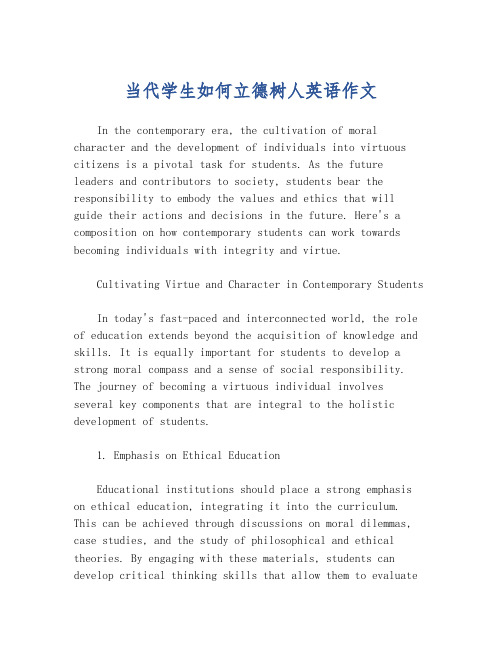
当代学生如何立德树人英语作文In the contemporary era, the cultivation of moral character and the development of individuals into virtuous citizens is a pivotal task for students. As the future leaders and contributors to society, students bear the responsibility to embody the values and ethics that will guide their actions and decisions in the future. Here's a composition on how contemporary students can work towards becoming individuals with integrity and virtue.Cultivating Virtue and Character in Contemporary StudentsIn today's fast-paced and interconnected world, the role of education extends beyond the acquisition of knowledge and skills. It is equally important for students to develop a strong moral compass and a sense of social responsibility. The journey of becoming a virtuous individual involves several key components that are integral to the holistic development of students.1. Emphasis on Ethical EducationEducational institutions should place a strong emphasis on ethical education, integrating it into the curriculum. This can be achieved through discussions on moral dilemmas, case studies, and the study of philosophical and ethical theories. By engaging with these materials, students can develop critical thinking skills that allow them to evaluatedifferent moral perspectives and make informed decisions.2. Role Modeling by EducatorsTeachers and other educational staff are role models for students. Their behavior, values, and attitudes can significantly influence the moral development of students. Educators should lead by example, demonstrating honesty, respect, and integrity in their interactions with students and colleagues.3. Community Involvement and ServiceActive participation in community service projects can instill a sense of empathy and social responsibility in students. By working to address social issues and help those in need, students can learn the importance of altruism and the impact they can have on the world around them.4. Encouragement of Self-ReflectionSelf-reflection is a powerful tool for personal growth. Students should be encouraged to regularly reflect on their actions, decisions, and the consequences of their behavior. This introspection can lead to greater self-awareness and a deeper understanding of their own values and beliefs.5. Promotion of Cultural and Global AwarenessIn an increasingly globalized world, it is important for students to understand and respect cultural diversity.Exposure to different cultures, traditions, and perspectives can foster tolerance and open-mindedness, which are essential for building a harmonious society.6. Development of Emotional IntelligenceEmotional intelligence is the ability to recognize, understand, and manage one's own emotions and the emotions of others. Developing this skill can help students navigate social situations, resolve conflicts, and build positive relationships.7. Supportive and Safe EnvironmentA supportive and safe learning environment is crucial for the moral and ethical development of students. Schools should provide a space where students feel comfortable expressing their thoughts and where they are encouraged to ask questions and explore ideas without fear of judgment.8. Lifelong Learning and AdaptabilityFinally, students should be encouraged to embracelifelong learning and adaptability. As society evolves, so too must our moral and ethical understanding. Continuous learning and a willingness to adapt to new information and perspectives are key to remaining a virtuous and responsible citizen.In conclusion, the task of nurturing virtue and character in students is a multifaceted endeavor that requires thecollective effort of educators, parents, and society as a whole. By focusing on ethical education, role modeling, community service, self-reflection, cultural awareness, emotional intelligence, and fostering a supportive environment, we can guide contemporary students towards becoming upstanding and ethical individuals who contribute positively to the world.。
生活中哲理英语作文
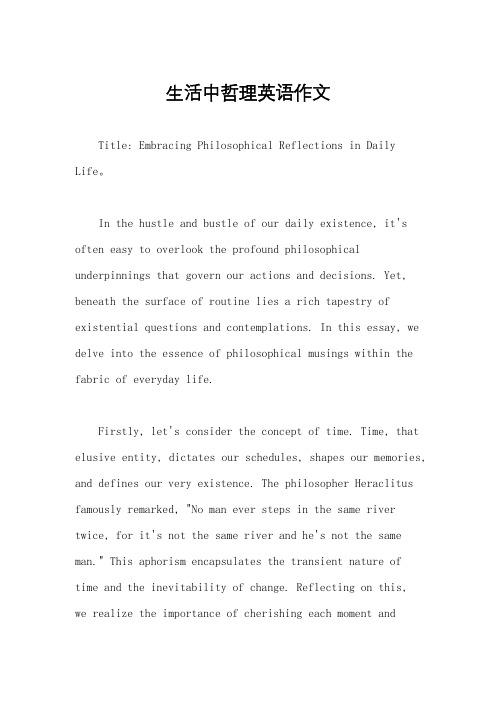
生活中哲理英语作文Title: Embracing Philosophical Reflections in Daily Life。
In the hustle and bustle of our daily existence, it's often easy to overlook the profound philosophical underpinnings that govern our actions and decisions. Yet, beneath the surface of routine lies a rich tapestry of existential questions and contemplations. In this essay, we delve into the essence of philosophical musings within the fabric of everyday life.Firstly, let's consider the concept of time. Time, that elusive entity, dictates our schedules, shapes our memories, and defines our very existence. The philosopher Heraclitus famously remarked, "No man ever steps in the same river twice, for it's not the same river and he's not the same man." This aphorism encapsulates the transient nature of time and the inevitability of change. Reflecting on this,we realize the importance of cherishing each moment andembracing the flux of life.Next, let's explore the notion of morality. In our interactions with others, ethical dilemmas often arise, challenging us to navigate the intricate web of right and wrong. The ethical theories of utilitarianism, deontology, and virtue ethics provide frameworks for grappling with these moral quandaries. Whether it's deciding to speak the truth in difficult circumstances or extending a helping hand to those in need, our actions are imbued with moral significance. Thus, by contemplating the ethical dimensions of our choices, we strive to lead lives of integrity and compassion.Furthermore, existential ponderings pervade our quest for meaning and purpose. The existentialist philosopher Jean-Paul Sartre famously asserted, "Man is condemned to be free." This assertion underscores the existential angst inherent in our freedom to choose and the responsibility that accompanies it. In navigating the labyrinth of existence, we confront questions of identity, agency, and ultimate meaning. Through introspection and self-examination, we endeavor to forge authentic paths aligned with our deepest values and aspirations.Moreover, the contemplation of knowledge and truth occupies a central place in philosophical inquiry. Epistemological questions concerning the nature of knowledge, belief, and justification prompt us tocritically evaluate our cognitive faculties. The philosopher René Descartes' famous dictum, "Cogito, ergo sum" (I think, therefore I am), highlights the foundational role of reason in establishing our existence. By engaging in intellectual inquiry and seeking truth amidst the sea of uncertainty, we expand our intellectual horizons and deepen our understanding of the world.In addition, aesthetics play a significant role in enriching our lived experience. The appreciation of beauty in art, nature, and human creativity elevates our spirits and nurtures our souls. The philosopher Immanuel Kant proposed that aesthetic judgments involve a harmonious interplay of subjective taste and universal principles of beauty. Thus, by immersing ourselves in the sublime and thepicturesque, we cultivate a sense of wonder and reverence for the beauty that surrounds us.In conclusion, the interplay between philosophy and daily life is profound and multifaceted. From pondering the nature of time and morality to grappling with existential questions of meaning and truth, philosophical reflections enrich our lived experience and deepen our understanding of the human condition. As we navigate the complexities of existence, let us embrace the wisdom of philosophy as a guiding light on the journey of self-discovery and enlightenment.。
伦理学家思想总结英文作文

伦理学家思想总结英文作文Ethics, the branch of philosophy that deals with moral principles and values, has been a subject of contemplation for philosophers throughout history. These thinkers have sought to unravel the fundamental questions of human existence, such as what is right and wrong, how should we act, and what is the ultimate goal of life. In this essay, I will provide a summary of the thoughts of some renowned ethicists and explore the diverse perspectives they bring to the field of ethics.One of the most influential ethical theories is consequentialism, which asserts that the morality of an action is determined by its consequences. Jeremy Bentham, an English philosopher, is considered one of the founders of this approach. Bentham advocated for the principle of utilitarianism, which suggests that one should strive to maximize overall happiness and minimize suffering. According to Bentham, actions should be evaluated based on their ability to bring about the greatest happiness for the greatest number of people. This principle emphasizes the importance of considering the consequences of our actions and assessing their impact on the well-being of others.John Stuart Mill, a disciple of Bentham, expanded on the concept of utilitarianism by introducing the idea of qualitative pleasures. He argued that not all pleasures are equal and that some are of higher quality than others. Mill believed that intellectual and moral pleasures have more value than physical pleasures, and that individuals should strive to cultivate these higher pleasures. Additionally, Mill introduced the Harm Principle, which suggests that the only valid reason to limit an individual's freedom is toprevent harm to others. This principle upholds the importance of personal autonomy and individual liberties.While consequentialism focuses on the outcomes of actions, deontological ethics takes a different approach by emphasizing ethical duties and principles that should guide our behavior. Immanuel Kant, a German philosopher, is a prominent figure in this school of thought. According to Kant, morality is based on rationality and the concept of the categorical imperative. The categorical imperative dictates that one should act according to principles that can be universally applied without contradiction. Kant believed in the inherent value of every person, arguing that individuals should always be treated as ends in themselves, rather than as mere means to an end. This principle underscores the significance of respecting the autonomy and dignity of others.Another ethical theory that diverges from consequentialism and deontological ethics is virtue ethics. Virtue ethicists, such as Aristotle, focus on the cultivation of virtuous character traits as the foundation of morality. Aristotle contended that the ultimate goal of human life is eudaimonia – flourishing or living well. He argued that eudaimonia is achieved through the development of virtues, such as courage, wisdom, and justice. Virtue ethicists place great importance on the cultivation of moral character and the integration of virtues into one's daily life. They believe that virtuous actions stem from virtuous dispositions that have been internalized over time.These are just a few key ideas from the vast field of ethics. Through the centuries, countless philosophers have contributed tothe development of ethical theories, each offering unique insights into how we can navigate the complexities of moral decision-making. While consequentialism focuses on the consequences of actions, deontological ethics stresses universal duties and principles, and virtue ethics prioritizes the cultivation of virtuous character. By exploring these diverse perspectives, we can gain a deeper understanding of ethics and apply this knowledge to lead more moral and fulfilling lives.。
伦理名词解释
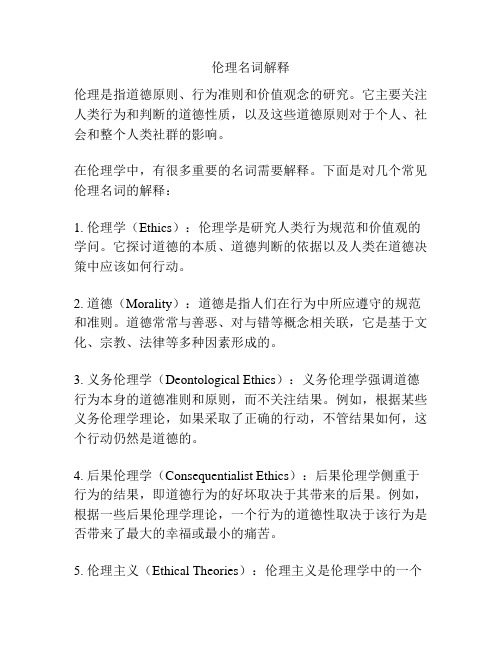
伦理名词解释伦理是指道德原则、行为准则和价值观念的研究。
它主要关注人类行为和判断的道德性质,以及这些道德原则对于个人、社会和整个人类社群的影响。
在伦理学中,有很多重要的名词需要解释。
下面是对几个常见伦理名词的解释:1. 伦理学(Ethics):伦理学是研究人类行为规范和价值观的学问。
它探讨道德的本质、道德判断的依据以及人类在道德决策中应该如何行动。
2. 道德(Morality):道德是指人们在行为中所应遵守的规范和准则。
道德常常与善恶、对与错等概念相关联,它是基于文化、宗教、法律等多种因素形成的。
3. 义务伦理学(Deontological Ethics):义务伦理学强调道德行为本身的道德准则和原则,而不关注结果。
例如,根据某些义务伦理学理论,如果采取了正确的行动,不管结果如何,这个行动仍然是道德的。
4. 后果伦理学(Consequentialist Ethics):后果伦理学侧重于行为的结果,即道德行为的好坏取决于其带来的后果。
例如,根据一些后果伦理学理论,一个行为的道德性取决于该行为是否带来了最大的幸福或最小的痛苦。
5. 伦理主义(Ethical Theories):伦理主义是伦理学中的一个分支,它提供了解释伦理问题和评判道德行为的理论框架。
常见的伦理主义包括道德主义、相对主义、利益伦理学等。
6. 道德相对主义(Moral Relativism):道德相对主义认为道德标准是相对的,取决于不同人或不同文化的观点。
它反对绝对的道德标准,主张人们应该尊重和接受其他人的不同道德观点。
7. 人权(Human Rights):人权是一种普遍适用于每个人的基本权利。
它们包括生命权、言论自由、信仰自由、不受虐待和歧视等。
人权理念强调人类的平等尊严和自由。
8. 公正(Justice):公正是指对每个人在社会、法律和行为中的平等对待。
公正的原则包括平等原则、需要原则、功德原则等。
伦理学和其中的名词对我们理解和解决现实生活中的伦理问题具有重要意义。
- 1、下载文档前请自行甄别文档内容的完整性,平台不提供额外的编辑、内容补充、找答案等附加服务。
- 2、"仅部分预览"的文档,不可在线预览部分如存在完整性等问题,可反馈申请退款(可完整预览的文档不适用该条件!)。
- 3、如文档侵犯您的权益,请联系客服反馈,我们会尽快为您处理(人工客服工作时间:9:00-18:30)。
Ethical theoriesTo be able to deal with responsibilities in an ethical way,we need to know more about ethics.What is ethics?And what ethical theories are around?That’s what we’ll discuss in this chapter.1Ethical definitions1.1What is ethics?The word ethics comes from the Greek ethos,meaning something like‘morals’.In fact,ethics is defined as the systematic reflection on what is moral.In this definition,morality is the whole of opinions, decisions and actions with which people express what they think is good or right.So,in short,to think ethically,you need to systematically reflect on what people think is good or right.Ethics is not a manual with answers on how to act.It is only a search for the right kind of morality.We can distinguish two kinds of ethics.The descriptive ethics is involved with the description of existing morality.It is about facts.Descriptive judgments are therefore true or false.On the other hand, there is the prescriptive ethics,also known as the normative ethics.This branch of ethics actually judges morality.Normative judgments are therefore value judgments:they indicate whether something is good or bad.We will mainly consider ourselves with normative ethics.1.2Norms,values and virtuesThe most important parts of normative ethical theories are values,norms and virtues.It is important to know the distinction between these three terms.•Moral values are matters/convictions that are worth striving for in general.Examples include justice,happiness,charity and such.A distinction can be made between intrinsic values and instrumental values.An intrinsic value is a value in itself:something that is worth striving for.An instrumental value is a value that only contributes to an intrinsic value.For example,if you want to get money to help people,then getting money is the instrumental value,while helping people is the intrinsic value.•Moral norms are rules that prescribe what actions are required,permitted or forbidden.In fact, some norms are so important and so prescriptive,that they have been turned into laws.Norms can often be deduced from values.But,whereas values are ideals which people want to achieve,norms are the means to realize these ideals.•Moral virtues are character traits that make someone a good person and allow him to lead a good life.Examples of virtues are honesty,courage,loyalty,creativity,humor,and so on.Virtues seem to be similar to values.But whereas values are things you strive for,virtues are character properties that are good to have.2Ethical theories2.1The extremes of ethical theories:relativism and absolutismThere are several ethical theories around.But,before we are going to discuss them,wefirst look at two extremes of the normative ethical theories.On one hand is normative relativism.It states that all moral points of view are relative.The morals of one person are not necessarily equal to the morals of another person.Next to this,it is also impossible to say that certain norms and values are better thanother norms and values.The problem with this theory is that it is now impossible to discuss normative ethics:all norms and values are allowed.On the other hand is absolutism,also known as universalism.It states that there is a system of norms and values that is universally applicable to everyone,everywhere at every time.Absolutism makes no exceptions:a rule is a rule.However,there is no set of norms and values that never contradicts itself. So,absolutism in general doesn’t work either.We know that both relativism and absolutism don’t work.Any choice/judgment based on one of these theories is ethically suspect.But we do know something important now:more useful ethical theories need to be somewhere between relativism and absolutism.2.2Duty ethics and the Kantian theoryEthics is all about choosing the right actions.An action is carried out by a certain actor with a certain intention.This action then leads to certain consequences.In ethical theories,we can focus on the action,the actor,the intention or the consequences.If we mainly focus on the action itself,then we use deontological ethics(also known as deontology or duty ethics).In duty ethics,the point of departure is the norms.An action is morally right if it is in agreement with moral rules/norms.Some theories within duty ethics depart from one main principle/rule from which all moral norms are derived.This is the so-called monistic duty ethics.On the other hand,pluralistic theories are based on several principles that apply as norms.Immanual Kant has developed the most well known system of duty ethics:the Kantian theory.A core notion here is autonomy.A man should place a moral norm upon himself and obey it.This is his duty.He should then,on his own,be able to determine through reasoning what is morally correct.The Kantian theory is part of monistic duty ethics:there is one universal principle.This principle is called the categorical imperative.It is formulated in different ways.Thefirst formulation is the universality principle:‘Act only on that maxim which you can at the same time will that it should become a universal law.’The second formulation is the reciprocity principle:‘Act as to treat humanity, whether in your own person or in that of any other,in every case as an end,never as means only.’There are several downsides to the Kantian theory.In Kant’s theory,rules can not be bent.This reminds us of absolutism.So,the question arises whether all the moral laws form a consistent system of norms. Another downside is that Kantian theory prescribes to rigidly adhere to the rules,irrespective of the consequences.But in real life,following a rule can of course have very negative consequences.Kant’s theory does not deal with these exceptions.2.3UtilitarianismWe don’t always have to focus on actions.We can also focus on consequences.If we do this,we wind up with consequentialism.One type of consequentialism is utilitarianism,founded by Jeremy Ben-tham.The name of utilitarianism is derived from the Latin‘utilis’,meaning‘useful’.In utilitarianism, the consequences of actions are measured against one value.This‘useful’value can be something like happiness,welfare or pleasure.It should be maximized.Utilitarianism is based on the utility principle:we simply need to give the greatest happiness to the greatest number of people.(Do note that we have silently made the assumption that‘pleasure’is the only goal in life,and that everything else is just a means to get pleasure.This idea/assumption is called hedonism.)An action is morally right if it results in pleasure,whereas it is wrong if it gives rise to pain. The freedom principle is also based on this.This principle states that you can do whatever you want, as long as you don’t cause anyone any pain/harm.There are several downsides to utilitarianism.Of course it is very hard to determine how much pleasurean action will actually give.Also,tofind the total amount of pleasure,we need to consider all individuals that are involved and add up their pleasures.But how do we quantify pleasure?And has the pleasure of one person the same value as the pleasure of another?Also,how do we decide whether one action gives more pleasure than another?Answering these questions is difficult.Even the clever John Stuart Mill did not have an answer,although he did have an opinion.He stated that certain pleasures(like intellectual fulfillment)are by nature more valuable than other pleasures(like physical desires). Another downside is that utilitarianism doesn’t always divide happiness in a fair way.For example,a very talented entertainer can make a lot of people happy.But does this mean that he needs to spend every waking moment entertaining people,until he burns out?However,most utilitarians argue that this isn’t a downside of the theory.In fact,they state that after a while,a small moment of spare time will give the entertainer more happiness than all the people he could have entertained in that time.Thus, utilitarianism automatically compensates for this‘flaw’.In utilitarianism,an engineer could also be asked to bend or break a fundamental rule,because this will result in the greatest happiness for the greatest number of people.For example,the engineer has the opportunity to save10million euros on a design.But he knows that this will later cause an accident killing5people.He argues that10million euros can cause more happiness than5lifes.To compensate for this,rule utilitarianism has been created.This kind of utilitarianism recognizes and uses moral rules.It is thus also similar to duty ethics.2.4Virtue ethics and care ethicsVirtue ethics focuses on the nature of the acting person.This actor should base his actions on the right virtues.So,the central theme in virtue ethics is shaping people into morally good and responsible creatures.Virtue ethics is rather similar to duty ethics.But,whereas duty ethics is based on certain rules/norms,virtue ethics is based on certain virtues.Virtue ethics is strongly influenced by Aristotle.He stated that every moral virtue is positioned some-where between two extremes.In fact,the correct moral virtue equals the optimal balance between these two extremes.For example,to be courageous,you need tofind an optimal balance between the two extremes of cowardice and recklessness.Sadly,there are downsides to this idea.The optimal balance often depends on the situation which a person is in.Also,moral virtues are subjective:you cannot generally say that the courageousness of one person is better than the courageousness of the other. Care ethics is a rather new ethical theory.It emphasizes that the development of morals is not caused by learning moral principles.Instead,people should learn norms and values in specific contexts.Other people are of fundamental importance here.By contacting other people,and by placing yourself in their shoes,you learn what is good or bad at a particular time.The solution of moral problems must always be focused on maintaining the relationships between people.So,the connectedness of people is the key.2.5Caveats of ethical theoriesSome people believe that applying ethics is just a matter of applying ethical principles to situations.But this is not true.One reason for this is the fact that there is no generally accepted ethical theory.And, different ethical theories might very well result in different judgments.So what should we do if we run into a new case?Well,we can apply our ethical theories to it.But we should be open to the possibility that the new case might reveal aflaw in our theory.Therefore,you should never blindly apply an ethical theory and rely on the outcome.Now you may wonder,what are ethical theories good for anyway?Ethical theories may function as instru-ments in discovering the ethical aspects of a problem/situation.(For example,applying consequentalism is a good way to explore the consequences of actions.)Similarly,ethical theories may suggest certain arguments/reasons that can play a role in moral judgments.。
